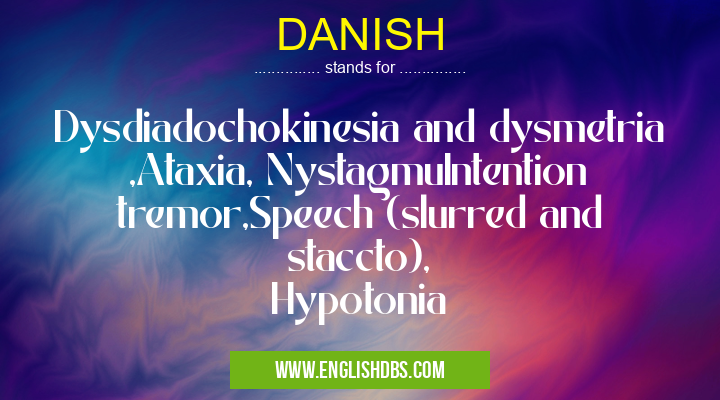What does DANISH mean in CLINICAL MEDICINE
DANISH is an acronym that refers to a set of conditions commonly seen in neurological disorders. The acronym stands for Dysdiadochokinesia, Ataxia, Nystagmus, Intention Tremor, Speech (slurred and staccato), and Hypotonia. These conditions can have a significant impact on the functioning of those affected.

DANISH meaning in Clinical Medicine in Medical
DANISH mostly used in an acronym Clinical Medicine in Category Medical that means Dysdiadochokinesia and dysmetria ,Ataxia, NystagmuIntention tremor,Speech (slurred and staccto), Hypotonia
Shorthand: DANISH,
Full Form: Dysdiadochokinesia and dysmetria ,Ataxia, NystagmuIntention tremor,Speech (slurred and staccto),
Hypotonia
For more information of "Dysdiadochokinesia and dysmetria ,Ataxia, NystagmuIntention tremor,Speech (slurred and staccto), Hypotonia", see the section below.
Essential Questions and Answers on Dysdiadochokinesia and dysmetria ,Ataxia, NystagmuIntention tremor,Speech (slurred and staccto), Hypotonia in "MEDICAL»CLINICAL"
What is Dysdiadochokinesia?
Dysdiadochokinesia is a neurological condition characterized by an inability to rapidly and accurately alternate movements between different muscle groups. It can appear as difficulty with activities such as quickly tapping your fingers or rapidly alternating feet when walking.
What is Nystagmus?
Nystagmus is an involuntary eye movement disorder which causes the eyes to move rapidly in an uncontrolled manner. This can cause issues with vision such as blurred or double vision, although it does not always cause symptoms.
Final Words:
DANISH is an acronym used to refer to six common neurological signs that can be seen in various disorders affecting the nervous system. While these conditions may significantly impact functioning, diagnosis and treatment options are available that may help those affected lead more comfortable lives.
